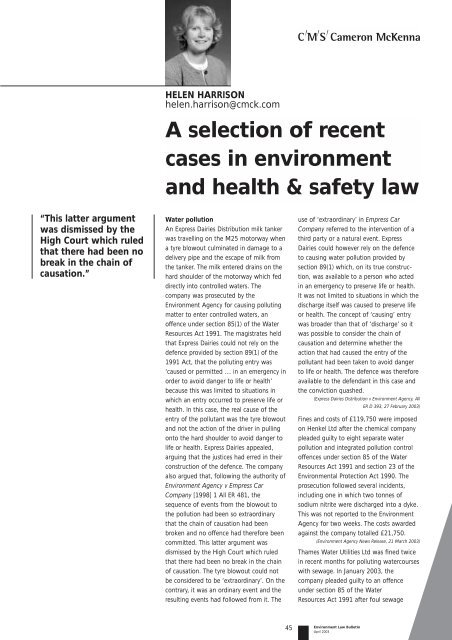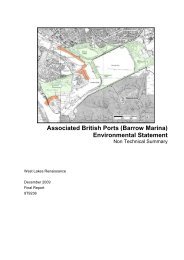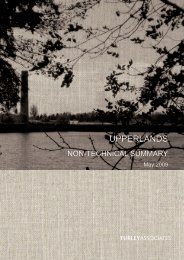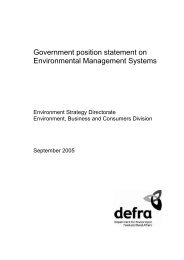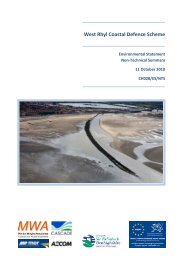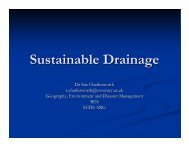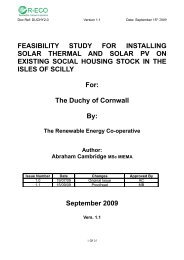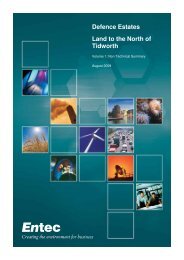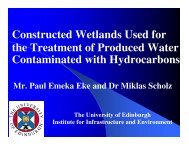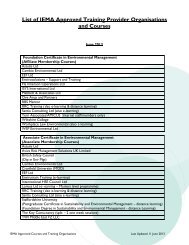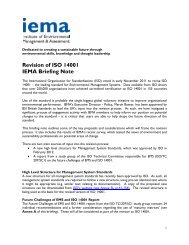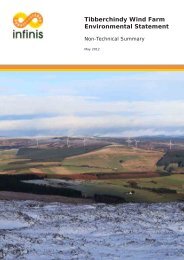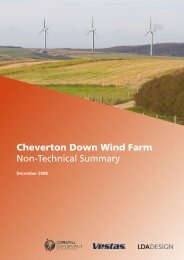Environment Law Bulletin - Institute of Environmental Management ...
Environment Law Bulletin - Institute of Environmental Management ...
Environment Law Bulletin - Institute of Environmental Management ...
Create successful ePaper yourself
Turn your PDF publications into a flip-book with our unique Google optimized e-Paper software.
HELEN HARRISONhelen.harrison@cmck.comA selection <strong>of</strong> recentcases in environmentand health & safety law“This latter argumentwas dismissed by theHigh Court which ruledthat there had been nobreak in the chain <strong>of</strong>causation.”Water pollutionAn Express Dairies Distribution milk tankerwas travelling on the M25 motorway whena tyre blowout culminated in damage to adelivery pipe and the escape <strong>of</strong> milk fromthe tanker. The milk entered drains on thehard shoulder <strong>of</strong> the motorway which feddirectly into controlled waters. Thecompany was prosecuted by the<strong>Environment</strong> Agency for causing pollutingmatter to enter controlled waters, an<strong>of</strong>fence under section 85(1) <strong>of</strong> the WaterResources Act 1991. The magistrates heldthat Express Dairies could not rely on thedefence provided by section 89(1) <strong>of</strong> the1991 Act, that the polluting entry was‘caused or permitted … in an emergency inorder to avoid danger to life or health’because this was limited to situations inwhich an entry occurred to preserve life orhealth. In this case, the real cause <strong>of</strong> theentry <strong>of</strong> the pollutant was the tyre blowoutand not the action <strong>of</strong> the driver in pullingonto the hard shoulder to avoid danger tolife or health. Express Dairies appealed,arguing that the justices had erred in theirconstruction <strong>of</strong> the defence. The companyalso argued that, following the authority <strong>of</strong><strong>Environment</strong> Agency v Empress CarCompany [1998] 1 All ER 481, thesequence <strong>of</strong> events from the blowout tothe pollution had been so extraordinarythat the chain <strong>of</strong> causation had beenbroken and no <strong>of</strong>fence had therefore beencommitted. This latter argument wasdismissed by the High Court which ruledthat there had been no break in the chain<strong>of</strong> causation. The tyre blowout could notbe considered to be ‘extraordinary’. On thecontrary, it was an ordinary event and theresulting events had followed from it. Theuse <strong>of</strong> ‘extraordinary’ in Empress CarCompany referred to the intervention <strong>of</strong> athird party or a natural event. ExpressDairies could however rely on the defenceto causing water pollution provided bysection 89(1) which, on its true construction,was available to a person who actedin an emergency to preserve life or health.It was not limited to situations in which thedischarge itself was caused to preserve lifeor health. The concept <strong>of</strong> ‘causing’ entrywas broader than that <strong>of</strong> ‘discharge’ so itwas possible to consider the chain <strong>of</strong>causation and determine whether theaction that had caused the entry <strong>of</strong> thepollutant had been taken to avoid dangerto life or health. The defence was thereforeavailable to the defendant in this case andthe conviction quashed.(Express Dairies Distribution v <strong>Environment</strong> Agency, AllER D 393, 27 February 2003)Fines and costs <strong>of</strong> £119,750 were imposedon Henkel Ltd after the chemical companypleaded guilty to eight separate waterpollution and integrated pollution control<strong>of</strong>fences under section 85 <strong>of</strong> the WaterResources Act 1991 and section 23 <strong>of</strong> the<strong>Environment</strong>al Protection Act 1990. Theprosecution followed several incidents,including one in which two tonnes <strong>of</strong>sodium nitrite were discharged into a dyke.This was not reported to the <strong>Environment</strong>Agency for two weeks. The costs awardedagainst the company totalled £21,750.(<strong>Environment</strong> Agency News Release, 21 March 2003)Thames Water Utilities Ltd was fined twicein recent months for polluting watercourseswith sewage. In January 2003, thecompany pleaded guilty to an <strong>of</strong>fenceunder section 85 <strong>of</strong> the WaterResources Act 1991 after foul sewage45<strong>Environment</strong> <strong>Law</strong> <strong>Bulletin</strong>April 2003


